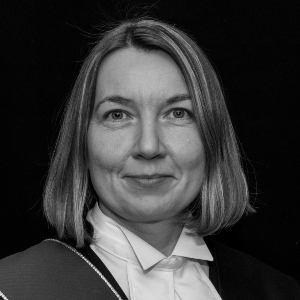The Honourable Edith Campbell
 WHAT WAS YOUR PATH INTO LAW AND ONTO THE BENCH?
WHAT WAS YOUR PATH INTO LAW AND ONTO THE BENCH?
When I was growing up, I was sure that my future was in the sciences and studied science in college to lay the groundwork for my career. But in my electives, I realized that I loved the social sciences as well. Torn between these two worlds, I applied for a bachelor’s degree in biology and a degree in law—and was accepted in both, which didn’t make my decision any easier. But my fascination with the law and the infinite possibilities within the field ultimately won out.
I had the good fortune of graduating from Ottawa University’s national civil law and common law program, which opened the door for me to practice law anywhere in the country.
I first worked as a Crown prosecutor with the Public Prosecution Service of Canada, then as a lawyer with the Department of Justice Canada. Over my 22‑year career, I have had the privilege to work in Quebec, the Ottawa area, the Maritime provinces, the Yukon and Nunavut. I worked on litigation cases brought under the Criminal Code and other federal legislation such as the Competition Act, as well as civil cases. I have also met and worked with all kinds of people who have each in their own way helped me grow, both as a person and as a professional.
I moved to the Yukon in 2003 for what was supposed to be a one‑year term as a Crown prosecutor. At the time, I didn’t think I’d stay there forever. But although living and working in the Yukon wasn’t always easy, I was surprised at how much I liked it. After we left, my family and I tried to make two other places our home, but eventually we had to face the fact that we all missed the Yukon too much. We moved back in 2013 and, a few years later, I decided to apply for a judicial appointment. In 2018, I became the first woman to be appointed resident judge of the Supreme Court of Yukon.
WHAT EXPERIENCE IN YOUR LEGAL CAREER BEST PREPARED YOU FOR WORK ON THE BENCH?
I think the diversity of my litigation experience, first in criminal law and then in civil law, was what best prepared me for my work as a judge, both in and out of the courtroom. The judges of the Yukon Supreme Court are generalists: we hear civil cases as well as family and criminal cases.
WHAT ADVICE TO YOU HAVE FOR COUNSEL WHO APPEAR BEFORE YOU?
Preparation is everything. That can’t be emphasized enough. The most successful and persuasive lawyers are able to zero in on the important facts and legal issues in their cases and know them inside out. You don’t want to raise and litigate every little issue imaginable, or else you risk losing your listener along the way. Be concise, organized and straight to the point, whether you’re speaking or writing. Avoid exaggerating and posturing—no one is impressed by that kind of thing.
Judges ask questions because they want to understand and get clarity, so answer them to the best of your knowledge and ability. In oral arguments, this could mean admitting when you haven’t investigated a peripheral issue that is raised and, if possible, suggesting a potential solution. Ignoring or giving vague answers to the judge’s questions won’t make them go away, and you could miss an opportunity to convince the judge of the merits of your position.
Be civil and courteous. Otherwise, you’ll not only tarnish your reputation, but ultimately be acting against your clients’ best interests.
WHAT DO YOU WISH THE PUBLIC KNEW ABOUT THE JUSTICE SYSTEM?
Our justice system may not be perfect, but we are fortunate to have a system that is independent, based on the rule of law and open to the public.
I also think it’s important to point out that our justice system could not function without the important efforts and contributions made by workers in courthouses across the country every day, including court clerks and other court office staff, sheriffs, judicial assistants, trial coordinators and IT staff.